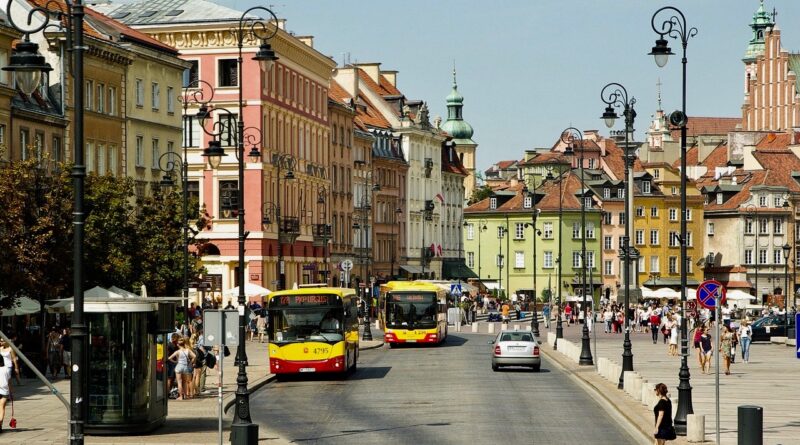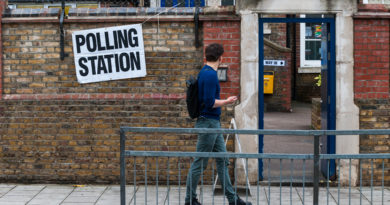Poland and UK sign voting rights agreement
Poland has become the fourth EU state to sign an agreement with the UK to continue granting citizens of the other country voting rights in local elections.
EU nationals living in another country of the European Union have the right to vote and stand as candidates in municipal elections. But with the UK withdrawal from the European Union, EU nationals in the UK and Britons in the EU were bound to lose this benefit, thus being excluded from political participation.
Even the withdrawal agreement did not cover voting rights, as the assumption is that UK nationals have lost EU citizenship and related political rights following Brexit. The British government, however, intends to negotiate the continuation of this benefit on a bilateral basis.
Wearing protective masks, British Ambassador Jonathan Knott and Poland’s Secretary of State for Legal and Treaty Affairs Piotr Wawrzyk signed the UK-Poland voting rights treaty on May 29 in Warsaw. Under the deal, British and Polish citizens will be able to vote and stand as candidates in local elections in each other’s countries in the future.
Mr Wawrzyk said the signing ceremony “bears a special, symbolic character” and “it is a proof that ties between Poland and the United Kingdom remain strong and resistant, also in the adverse circumstances of the global pandemic”.
The Secretary of State added that Poland and the UK are linked by many forms of bilateral co-operation and that the treaty has “first and foremost a human and civic dimension” as it “strengthens the ties… by building a sense of the Polish-British community on the local level”.
“We have protected the rights of nearly a million British and Polish citizens who live and work in each other’s countries,” commented UK Foreign Office Minister for the European Neighbourhood Wendy Morton. “This treaty underlines our countries’ shared commitment to democracy and is a testament to the close ties between the UK and Poland, and our people,” she added.
British Ambassador to Poland Jonathan Knott said: “We have been determined that the difficult working environments we are all operating in due to the coronavirus pandemic should be no barrier to ensuring the rights of UK nationals living in Poland to elect their local representatives for many years to come, rights that will also be protected for Polish nationals living in the UK.”
Polish Ambassador to the UK Arkady Rzegocki also welcomed the treaty. “The ability for Poles to choose their representatives in local authorities, but also to apply for the positions of councillors and mayors, is of great significance not only for increasing the visibility of our compatriots in the United Kingdom – who have lived here for generations and have contributed significantly to the British cultural, economic and social life – but it also gives practical tools to implement their important demands,” he said.
Several countries covered by voting rights
Poles are the largest community of EU nationals in the UK. According to Eurostat, the EU statistical office, in 2019 some 920,000 Polish citizens were living in the UK (down from over a million in 2017) and about 2,600 British citizens were living in Poland.
Last year the UK signed similar treaties with Spain, Portugal and Luxembourg. EU citizens from Malta, Cyprus and Ireland can already vote in the UK under separate arrangements.
The treaty with Poland brings the number of EU citizens in the UK covered by voting rights agreements to some 1,680,000, just less than half of the total.
Some EU countries also grant by law the right to vote and stand in local election to residents of other nationalities.
Participation not guaranteed
Despite having voting rights, however, participation is not guaranteed. A survey among young Europeans in London carried out by citizens’ rights group the3million showed that the vast majority of the respondents were not involved in UK politics.
Some were unaware of their voting rights at local level. Many said they were registered, but the majority did not vote. Many reported a lack of time or resources to get involved, and argued that they would be more keen to engage if they could vote in national elections and referendums.
“There is a sense amongst participants that engagement is low because migrant communities are not well organised and there are very few or no community leaders of whom they are aware,” the survey says. The research concluded that young Europeans “are more likely to get involved when they see people like them in politics”. The voting rights agreements might help them reach the goal.
Claudia Delpero © all rights reserved.
Image: Warsaw, by Jacqueline Macou from Pixabay.
Europe Street News is an online magazine covering citizens’ rights in Europe. We are fully independent and we are committed to providing factual, accurate and reliable information. We believe citizens’ rights are at the core of democracy and information about these topics should be accessible to all. This is why our website and newsletter are available for free. Please consider making a contribution so we can continue and expand our coverage.





